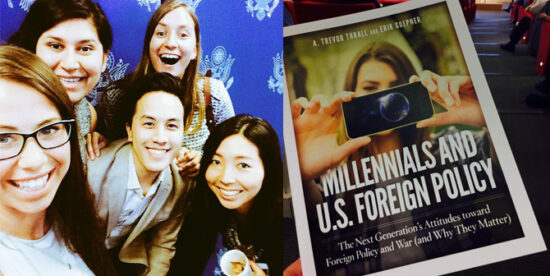
IN HONOR OF INTERNATIONAL YOUTH DAY, TWO GLOBAL TIES MILLENNIALS SHARE THEIR PERSPECTIVE ON THE FUTURE OF FOREIGN RELATIONS.
At a time when 65% of U.S. adults say the world is more dangerous than it was several years ago, and 51% say the United States does too much to help solve world problems, it is easy to be pessimistic about the future of foreign relations. As members of the millennial generation—born between 1980 and 1997—our world view is shaped, in large part, by the events of 9/11 and the wars in Iraq and Afghanistan. The tragedy of the lives lost and damage done may have given us a case of “war fatigue.”
But there is reason to believe that pessimism is not destined to win out—it is in our power to find another way forward and take action. Because those formative events have also opened our eyes to the world and inspired many in our generation to make a difference.
We have experienced rapid globalization and technological advancements that put us in constant contact with people from all over the world, leading this generation to a more progressive approach to differences in race, gender, and even sexual orientation and gender identity. The ease with which we can send a Tweet or a Valencia-filtered image on Instagram has contributed to a stronger global community, where horizontal exchanges of ideas and information are commonplace. This has led millennials to be more receptive to the need for diplomacy than many previous generations, who lived in a less connected world that was heavily influenced by the Cold War.
Millennials are more supportive of international organizations like the United Nations and less supportive of defense spending.
According to A. Trevor Thrall and Erik Goepner’s research entitled “Millennials and U.S. Foreign Policy,” millennials are hyper-connected. They are the best-educated, most ethnically and racially diverse cohort in history. Because of this, millennials are comfortable with people from all walks of life—and it shows in how they feel about foreign relations. Millennials are more supportive of international organizations like the United Nations and less supportive of defense spending. And as the oldest millennials take positions of authority in U.S. foreign policy making, we hope new practices and more inclusive approaches can be implemented in American diplomacy.
It is already happening. Increased openness to global engagement can be seen in the United States’ pivot to Asia. Thrall and Goepner say that millennials tend to view China more as a partner than as an adversary. As graduate students at The George Washington University, we can vouch for the positive outcomes of these daily people-to-people exchanges with Chinese international students. For example, the Sigur Center for Asian Studies offers activities like the weekly Chinese Tea Time. These moments of being in the same room with our global peers and having conversations about where we come from and how we view the world allows us to break down barriers. Any kind of exchange remains an important tool to dispel misperceptions and foster that partnership.
Celebrating its 75th anniversary this year, the Department of State International Visitor Leadership Program (IVLP) continues to be a force for increased cooperation and bridge-building as it brings future leaders from around the world to the United States, enabling them to meet with their counterparts and engage in constructive dialogue. These conversations with citizens across the U.S. are around major foreign policy issues such as entrepreneurship and STEM; Countering or Preventing Violent Extremism (CVE/PVE); climate change; trafficking in-persons or drugs; strengthening civil society; and more. This channel to candidly speak about global issues and share perspectives creates life-changing experiences, which will contribute to better cooperation in the international community.
…we view our openness to more creative public diplomacy measures as a re-channeling of our “war fatigue” toward positive change and harmonious international relations
The findings from Thrall and Goepner’s report should be encouraging for those of us in the international exchange community. But we shouldn’t forget the ongoing challenges we face, including international millennials and future generations’ attitudes towards the United States. In particular, Arab millennials have been raised in an era where their countries have strained relations with the United States. We should be mindful of the weight historical context and major events have on shaping world views.
Older generations may view millennials’ reluctance to adopt hard power strategies with concern. However, we view our openness to more creative public diplomacy measures as a re-channeling of our “war fatigue” toward positive change and harmonious international relations. But it’s not something that will happen automatically. It’s a choice each one of us has to make, and we need to encourage our peers as well. As part of this dynamic generation that can expand the role of global partnerships in world affairs, it is up to all of us to advocate for exchanges and ensure that the millennial generation actively participates in the shaping of our world. The international affairs budget is only 1 percent of the entire federal budget. Only .018 percent of that goes to U.S. Department of State sponsored international exchanges. Pledging your support for our #ExpandYourWorld campaign is one way you can get involved, and bring us one step closer to a more peaceful and prosperous world. Whether it be informing Congress about the importance of public diplomacy programs or hosting an exchange participant, there’s always a role for you to play, so take the #ExpandYourWorld pledge today!
By Yoonji Kim and Sebra Yen, Global Ties U.S.
